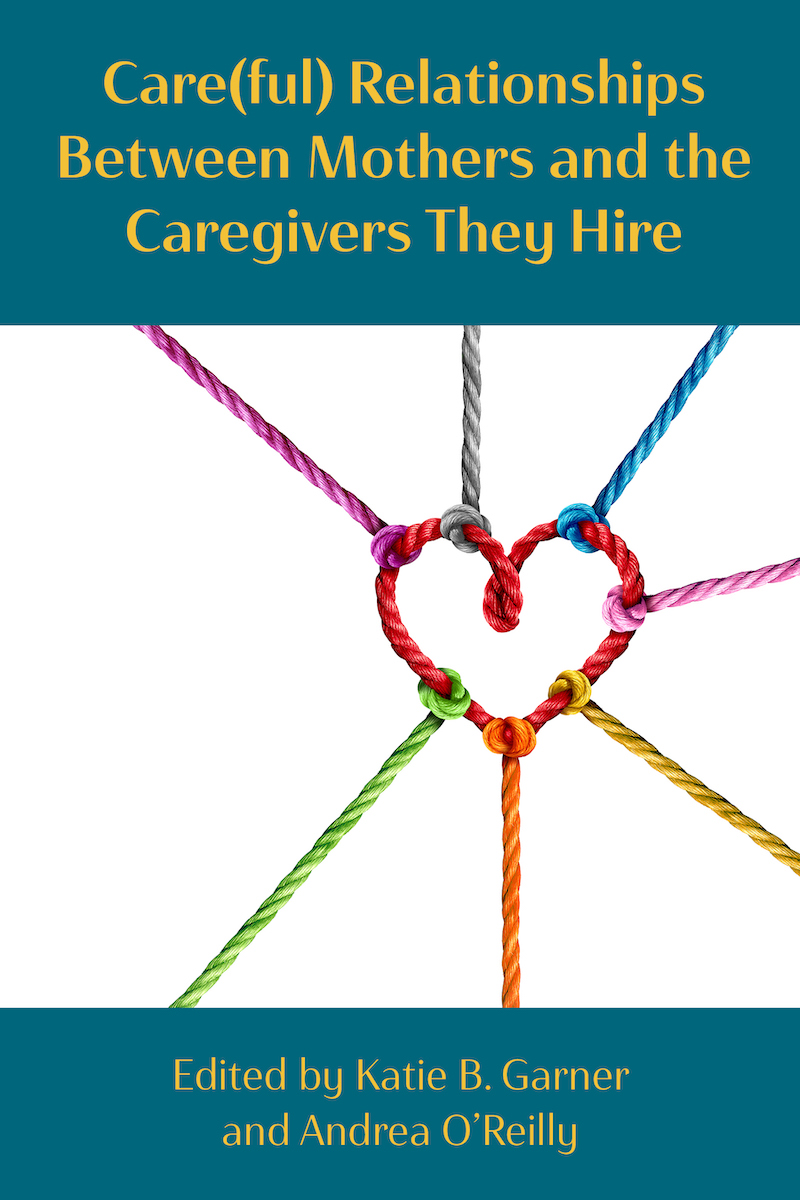
Price: $44.95
Page Count: 360
Publication Date: January 2024
ISBN: 978-1-77258-466-0
"Care(ful) Relationships Between Mothers and Caregivers They Hire" is a compelling anthology that delves deep into the intricate dynamics of mother-caregiver relationships. With a diverse collection of essays and empirical chapters, this timely volume offers valuable insights into these relationships' nuance, power dynamics, and cultural contexts. It is a thought-provoking read for anyone interested in exploring the complexities of caregiving today.
Expertly weaving together historical, cultural, and international perspectives, this interdisciplinary anthology is a must-read for scholars and students in fields such as Media Studies, Communication, Sociology, Anthropology, Maternal Studies, and anyone that may be interested in understanding the complexities of caregiving in various contexts.
- Jessica A. Leveto, Ph.D., Associate Professor of Sociology, Kent State University at Ashtabula
(Care)ful Relationships is significant and important as it deals with an age old dynamic between hired caregivers and mothers and the inequality that develops from that relationship. It brings to light varied dimensions of care work (paid and unpaid) using a multi-method approach that gives voice to a variety of disciplines, especially the arts and humanities. This diversity gives texture and breadth to global audiences by taking the reader on a nuanced journey through what care work really means and can look like for both the caregiver and the parent while digging deeper into the consumerism of care work and how that fits in a patriarchal capitalist system.
- Tamara Mose, Professor of Sociology at Brooklyn College and author of Raising Brooklyn: Nannies, Childcare, and Caribbeans Creating Community
Introduction
Katie B. Garner
Untitled Tanka
Tracy Royce
Section I: (Re)Telling One’s Story: Autoethnography, Drama, and Poetry
1.
Helpers: A Personal Reflection on the History and Language of Domestic Service
Elizabeth Cummins Muñoz
2.
Mothering for Pay: The Perspective of a White, College-Educated Nanny
Rachel O’Donnell and Madeline Wood
3.
Mothering in the Balance: Rewriting the Mother Code to Serve the Whole Family
Gertrude Lyons
4.
Murky Milks: Outsourcing Breastmilk and Maternal Failure in the Early Modern Ballad Lamkin
Chrissie Andrea Maroulli
5.
(Care)Give and (Care)Take: Boundaries, Differences, and Choice in Dramas about Undocumented Care
Lynn DeBoeck
Section II:
Contemporary Representations of Nannies in Literature and Film
6.
Mrs. Banks and Mary Poppins: Tensions of the Maternal Nanny
Jane Griffith
7.
“The Damage Done and May This Madness Be Over”: Exposing and Eradicating Matrophobia through a Reading of the Nanny Trope in the Psychological Thrillers The Nanny and Nanny Dearest
Andrea O’Reilly
8.
“Family Exchange Norms and Mother-Nanny Relationships in Leila Slimani’s The Perfect Nanny and Kiley Reid’s Such a Fun Age
Jill Goad
9.
Seeing Beyond Black and White in the Mother-Nanny Novel: Problematics, Purpose, and Possibilities of Empathy
Katie B. Garner
10.
“I’m Quitting Your Service; I’ve Had Quite Enough”: Representations of Caregivers’ Subjectivity in Tamara Mose Brown’s Raising Brooklyn and Victoria Brown’s Minding Ben
Elizabeth Podnieks
Section III:
Care(ful) Relationships around the Globe: Sociological and Anthropological Analyses
11.
Between Cosmopolitan Mothering and the Global Care Chain: Japanese Mothers, Intra-Asian Migration, and Everyday Struggles of “the Nanny Question”
Aya Kitamura
12.
Paradoxes of Power in Carework
Laura Bunyan and Barret Katuna
13.
Kin Care Versus Paid Care: How Black College Women Navigate Dual Roles and Work to Earn a Degree
Yolanda Wiggins
14.
Friending with the Caregivers: An Autoethnographic Study of a Bengali Household
Medhashri Mahanty
15.
Temporary Sisterhoods: Thinking Ethics through Postnatal Care among South-Asian Muslims
Safwan Amir
Notes on Contributors
Katie Bodendorfer Garner, PhD focuses on motherhood, childcare, and labor equality. She has been the executive director of IAMAS since 2019 and is a valued member of CareForce, a small group of prestigious thought leaders on carework. Her (in-progress) book, The Illusion of Choice, incorporates interviews with nearly 100 U.S. women and addresses inequalities of work, childcare, and motherhood. Academic writing appears in Palgrave, Demeter Press, JMI, and MaMSIE. Katie has been consulted for or appeared in releases by Center for Public Integrity, Chicago Tribune, Fast Company, Nature, NPR, WGN Radio and numerous podcasts. You can find out more at https://drkatiebgarner.com.
Andrea O’Reilly, PhD, is full professor in the School of Gender, Sexuality and Women’s Studies at York University, founder/editor-in-chief of the Journal of the Motherhood Initiative and publisher of Demeter Press. She is co editor/editor of thirty plus books including Feminist Parenting: Perspectives from Africa and Beyond (2020), Mothers, Mothering, and COVID-19: Dispatches from a Pandemic (2021), Maternal Theory, The 2nd Edition (2021), Monstrous Mothers; Troubling Tropes (2021, Maternal Regret: Resistances, Renunciations, and Reflections (2022), Normative Motherhood: Representations, Regulations, and Reclamations (2023) and Coming into Being: Mothers on Finding and Realizing Feminism (2023). She is editor of the Encyclopedia on Motherhood (2010) and co editor of the Routledge Companion to Motherhood (2019). She is author of Toni Morrison and Motherhood: A Politics of the Heart (2004); Rocking the Cradle: Thoughts on Motherhood, Feminism, and the Possibility of Empowered Mothering (2006); and Matricentric Feminism: Theory, Activism, and Practice, The 2nd Edition (2021). She is twice the recipient of York University’s “Professor of the Year Award” for teaching excellence and is the 2019 recipient of the Status of Women and Equity Award of Distinction from OCUFA (Ontario Confederation of University Faculty Associations). She has received more than 1.5 million dollars in grant funding for her research projects including two current ones: “Older Young Mothers in Canada” and “Mothers and Returning to ‘Normal’: The Impact of the Pandemic on Mothering and Families.”


